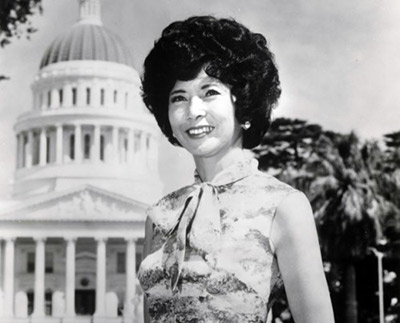
It almost goes without saying that 2016 may prove to be another historic, breakthrough year for women in politics. In recognition of this, the Oral History Center has initiated a new project to highlight the rare and important interviews in our collection of women who, against tremendous odds, broke through glass ceilings and forged their own path in the political arena. Over the next few months, we will feature some of these noteworthy pioneers in our newsletter. Also be on the lookout for a new audio series we are putting together on this very important subject.
This month we pay tribute to March Fong Eu, former Secretary of State and member of the State Assembly in California. Fong Eu was the subject a major oral history interview conducted by the Center in 1978. From an early age, Ms. Eu was considered a trailblazer, earning a BS in Dentistry from UC Berkeley and a PhD in Education from Stanford University. In 1966, after years of work in local politics, she announced her candidacy for the State Assembly. Although bold and inspiring, the move garnered little support initially from the Democratic Party. Even Nicholas Petris, a Democratic incumbent in Eu’s district who knew her well, gave his endorsement to another candidate. “When you’re pressed to endorse candidates, sometimes you ultimately make a decision as to the one that?s going to win, more than the person you prefer,” Eu would recall. “Maybe he just felt that it couldn’t happen that I would win: There was only one woman in the legislature; women just did not get elected. And a Chinese woman at that.”
March Fong Eu proved them wrong. She won the Democratic primary, and went on to win in the November election, becoming not only the second woman elected to the California Legislature, but also the first from Asian ancestry. After serving four terms, she successfully ran for Secretary of State in 1974, becoming the first Asian American woman elected to a state constitutional office in the United States. She would hold that office for the next two decades, resigning in 1994 to serve as U.S. Ambassador to the Federal States of Micronesia at the request of President Bill Clinton.
March Fong Eu’s accomplishments in Sacramento were many. In the Legislature, she pushed to abolish paid toilets in public buildings, an unfair and discriminatory feature for women, and spearheaded many successful policy campaigns in the fields of education, public health, consumer affairs, farm pesticide safety, family planning, environmental protection, and tax reform. As Secretary of State she instituted innovations such as voter registration by mail, at-large absentee balloting, internet reporting of all election-related data, and the inclusion of candidate statements in ballot pamphlets. Throughout her thirty years of service, Ms. Eu stood as a pioneer in California politics, opening doors for the number of women who followed. As she would later observe, her tenure in Sacramento helped many “accept the fact that change is here and change has come.”
Excerpts from her speech, ‘The Self-Sufficient Woman’ February 1973
If there is one field where women must be especially self-sufficient, it is politics. I say this not only because I could cite statistic after statistic about the small number of women in elected offices. I say this not only because I could talk about the virtual void of women in higher political administrative positions?. But my saying women have to be especially self-sufficient in politics has to do with a kind of ?seriousness syndrome? which is part of the double standard in politics…
When women have fun, there seems to be a massive male overreaction. When one burning took place of a uniquely female garment of support, all of a sudden all women seeking legal justice and social equality were frivolous, crazy bra-burners. If I may speak jocularly, I wonder if someone revolting against the rather unusual athletic mystique in this country were to burn a uniquely male garment of support, whether there might be a similar reaction.
Maybe if some men had to bear and rear unwanted babies themselves, they would understand better our resentment of laws relating to our reproductive systems. Maybe if some men let their wives involuntarily control their income, they would understand better our resentment of present discriminatory statutes directed toward women as a class. And maybe if some men were raped, and, in pursuit of justice, they found that they had to reveal humiliating information about their past lives- maybe then they would understand the anger of women who feel they are doubly wronged by rapists and the laws concerning rape.
I guess what I am saying is that I believe it is about time that some men need to do some honest rethinking about their perspective and prejudices.
Being one of only two women in the California Legislature, in the last six years I have been in a good position to see the emerging political activism of women and I am delighted by it…
I am confident that the two constituencies for whom I have become something of a symbol will continue to grow in power and influence so that no longer will they feel that they are constantly being ‘White-Maled.’
Todd Holmes, Oral History Center